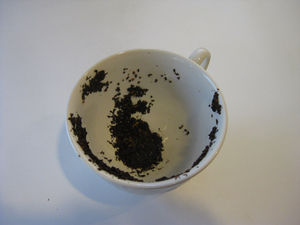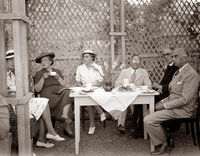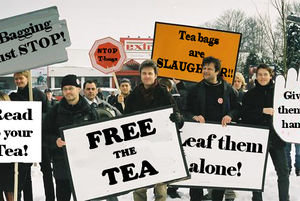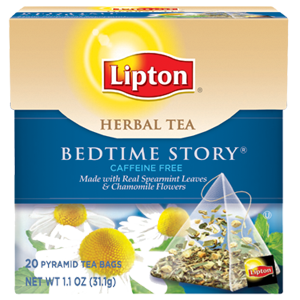Tea-leaf reading

Reading to a tea-leaf is a method of tea preparation. Eventually the tea will be able to read all by itself, and possibly get a good job as a librarian or a historian. Teaching a tea leaf to read generally takes two to three years, but for some of the simpler species (such as English Breakfast) teaching time can take up to 6 years. Reading to tea-leaves in groups of 100 or more is common, however, groups larger than 1000 often cause clumping and it is difficult to get any sense out of them at all.
The major difficulty involved in tea-leaf reading is to get the little buggers to listen. They get easily distracted, and (much like Gremlins) if there is water anywhere near them, all they do is sit and steep. Allowing your tea-leaves to steep for too long is not recommended, because they grow too weak and grow tired (unlike Gremlins).
Critics of tea-leaf reading are usually misinformed twits[1].
History[edit | edit source]
On a spring afternoon in 1941, Earl Charles "Martha" Grey was recovering after a splendid social event[2]. He made a cup of his patented "Earl Grey" tea[3] and was about to discard the tea leaves, when he was distracted by a book. He read part of it out loud to himself and noticed that the tea leaves started to jiggle. And the art of tea leaf reading was born.
During the later part of the 40's and early 50's tea-leaf reading became very popular. The Tea Leaf Reading Association (TLRA) was formed in 1949 and within two years was running around the globe. Members would gather and discuss what tea they'd read to during the week, noted points of interest regarding the tea-leaves' reactions and much more. Most of the TLRA's branches had disbanded by the end of the 50's though, presumably with the onset of tea-bagging and also due to the inferior tea market taking control of the world's tea supply. Today, only one branch remains, gathering bi-monthly in the township of Llanfairpwllgwyngyllgogerychwyrndrobwllllantysiliogogogoch
“A bad cup of tea? Not anymore! Teach your tea to read!”
– 1940's Advertisemenat on Tea-leaf reading
Modern Usage[edit | edit source]
Tea-leaf reading is regarded by many as a forgotten art. There are very few experts remaining in the field. As a result, overall intelligence of tea strains is declining rapidly.
Many think that this is largely because of the rise in popularity of the modern teabag. Due to the billions of tea leaves being discarded daily, killed mercilessly without so much as even a "Once upon a time", tea organizations around the world regularly hold protests about "tea rights".
Thankfully, the Free Trade Agreement has allowed some of the more obscure tea strains to be accessible once again to the public. Experts in the field, most notably Sir Jim'll of Savile has predicted that this will cause a surge in the act of tea-leaf reading once again[4], and says we are at the dawn of a New Age, one where we will once again be able to experience a "decent cuppa".
“Think of the children!!”
– Random mother on lack of tea-leaf education
Varieties[edit | edit source]
Depending on the type of tea leaf used, different methods are required. Also, depending on the type of story being read, certain teas respond better to different subjects.
Black tea[edit | edit source]
- Reading to a black tea-leaf is quite difficult. Many of the older stories are non-PC so modern remakes of these are required, such as "Snow Beige" and "The Three Codependent Goats Gruff".
Oolong tea[edit | edit source]
- Reading to oolong tea is very tiresome and is not recommended for the novice, as they're very excitable and prefer long stories. Experienced tea-leaf readers are able to pacify oolong tea by reading the bible, or a law textbook. Justin Smith of Ohio has also reported some success reading the labels of shampoo bottles.[5]
Green tea[edit | edit source]
- Green tea likes nature. Gardening books work well, and also "fairy" stories (the ones with actual fairies). It also like the colour green, so stories involving Kermit the Frog also go over well.
Yellow tea[edit | edit source]
- Due to it's strong odor and high urine content, reading to yellow tea is best done in short bursts, for the sake of your nostrils and general health. Or wear a gas mask. Seriously, it stinks.
White tea[edit | edit source]
- Stuck up and spoiled, white tea grew up in a life of luxury and only accepts reading of tea-council-approved materials.
Earl Grey tea[edit | edit source]
- Earl Grey's tea is wimpy and doesn't like to cry. Keep the stories about bunny rabbits and kittens. And for god's sake let everyone live and end the story "happily ever after" - you won't hear the end of it if you don't.
Lapsang souchong tea[edit | edit source]
- 正山小種紅茶是好的多開心快樂。閱讀本書,大笑道。[6]
English Breakfast tea[edit | edit source]
- Because English Breakfast tea is the sort of tea the English like to have at breakfast, and it is well known that the English are not very sociable at that time of the morning, this tea has adapted itself to a very simple vocabulary. Stories which contain single syllable words are best, and three to five words maximum are recommend per sentence.... "Jane throws the Ball" and "Dick likes the dick" is about the capability of this species.
Irish Breakfast tea[edit | edit source]
- Stories about leprechauns and potatoes will serve Irish tea just fine. A relaxed tea, prefers happy stories, however is fairly easy to please and will learn quickly.
Jasmine tea[edit | edit source]
- Jasmine tea wants to hear stories of distant lands and magic carpet rides. Show her the world. She smells pretty too....
Russian Caravan[edit | edit source]
- This tea has been around for a long time, but how long no one knows, due to it's gypsy-like nature. It has been reported that tea-leaf reading was being done to Russian Caravan tea over 200 years ago, however this is likely to be just folklore. This gypsy-like variety of tea will enjoy romance and adventure stories the most, but just don't leave your wallet unattended.
Coffee[edit | edit source]
- Coffee needs to be taken out back and shot. Don't bother reading to it. It's not worth it. Put us all out of our misery.
Rooibos[edit | edit source]
- Rooibos grew up on a farm. This explains why he smells of straw and cow pats. His parents couldn't spell so that's why he has too many vowels in his name. Stick to farm-related stories and this one will not give you any trouble.
Lemon and ginger[edit | edit source]
- A very stubborn and strong willed tea. Will demand your respect before it lets you open the first page. Heart-felt stories with good morals are the best for this tea.
Peppermint[edit | edit source]
- Enjoys Charlie Brown stories, especially the ones with Peppermint Patty in them.
Chamomile[edit | edit source]
- Chamomile will give you a headache with it's incessant questions and opinions; usually health related. Not for the fainthearted.
- Once a upon a time there was a bear... Was it sick?.... no I don..He probably had a bad back. Did you know that there is a herbal remedy for... Can I continue the story? Oh yes This bear lived in the woods. Speaking of wood, did you know that cinnamon is bark? And it's also good for the digestive system..
- This tea will keep interrupting you and try to force what ever hippie health-fad it is currently involved in. Very tiresome.
References[edit | edit source]
- ↑ Says I.
- ↑ Twas a raunchy shin-dig, and I think Beatrice took her top off! I know! Beatrice! The duchess will not be pleased!
- ↑ He's a bit of a douche.
- ↑ Who the heck is Sir Jim'll of Savile?
- ↑ Please read - "Oooooh-long : My tea-reading journey" by Justin Smith
- ↑ Lapsang black teas are good happy. Read this book and laugh track.


